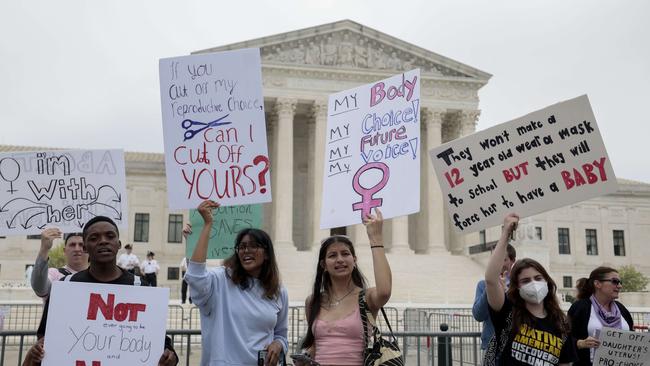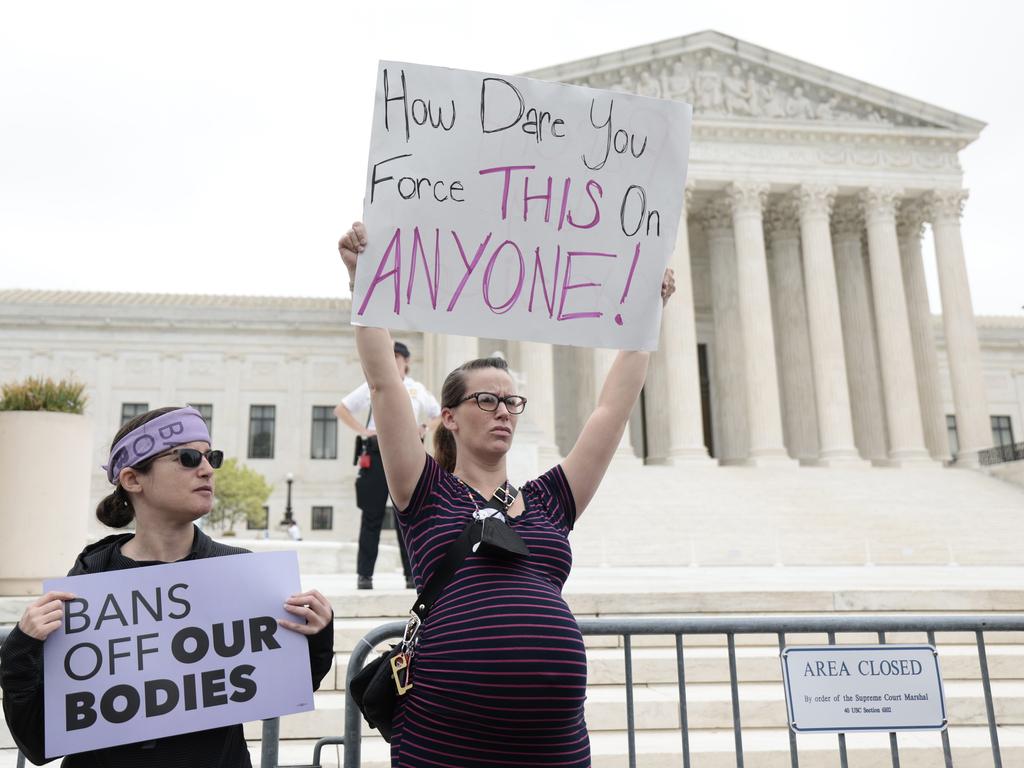Roe v Wade: After abortion-opinion leak parties weigh next steps
The Supreme Court’s draft opinion has affected the Democratic and Republican calculus for midterm elections.

Democratic and Republican leaders are weighing their next political steps on abortion after a leaked draft opinion suggested that the Supreme Court was poised to overturn the landmark Roe v Wade decision.
The prospect of such a ruling just months before midterm elections that will determine which party controls Congress has Senate Democratic leaders planning to put on the floor next week a bill to codify the existing abortion right laid out by Roe and related court decisions. It has no chance of passing because of Republican opposition in a 50-50 Senate, where procedures require a supermajority to advance most legislation. But Democrats could point to the blockade in an attempt to energize voters, particularly as some GOP-led states mobilize to enact laws banning the procedure.
“This is about a lot more than abortion,” President Biden said at a White House event Wednesday when asked about the next steps following the leaked draft. He said the rightward tilt of the court could also put in play other precedents regarding LGBT rights and contraception.
Democrats are betting on the salience of the issue for both base and swing voters, saying Republicans’ championing of conservative justices and blocking of former President Barack Obama’s final high-court pick led to the current balance of the court and the possible demise of the right to abortion.
“The blame for the end of Roe lies primarily right across the aisle here, ” Senate Majority Leader Chuck Schumer (D. N.Y.) said in a floor speech Wednesday. “The nation will be watching to see who in this chamber will defend this precious right to choose.” Republicans remained cautious in their statements about the possible sea change in abortion law, instead focusing largely on criticizing the leak itself, calling it an underhanded effort by the left to influence the court. They have presented no evidence identifying a leaker, and the court has launched an investigation.
The leak created “a lot of confusion, more than a little hysteria, all of which is frankly beside the point because the court actually hasn’t decided anything,” said Senator John Cornyn (R., Texas). “This was a stunning breach of confidentiality,” he said.
Republican senators are also grappling with the practical impact if Roe is overturned, forcing them to weigh questions about the extent of their antiabortion positions. In some GOP-controlled states, the so-called trigger laws that will go into effect if Roe is overturned are more restrictive than even some ardent antiabortion members of Congress would prefer.
Sen. Josh Hawley (R., Mo.), for example, supports exceptions allowing abortion in cases of rape and incest, but Missouri’s trigger law bans all abortions except in cases of medical emergency, and it would be a felony, punishable by 5 to 15 years in prison, for anyone to perform an illegal abortion.

“I think there will be democratic debate about this. I think you’ll have a lot of back and forth,” Mr Hawley said. “That’s a good thing. That’s democracy.” Asked if he would make an exception to abortion prohibitions in cases of incest or rape, Senator John Kennedy (R., La.) declined to answer. “You’re asking me a hypothetical question,” he said. “Come back and see me after the Supreme Court rules.” The two sides also have disagreed on the centrality of abortion to the midterms results. Some Republicans have called it a distraction from what they see as Democrats’ weak record, particularly on inflation, while Democrats have called it pivotal. At an event Tuesday night, Mr Schumer cited abortion rights as central to winning Senate races in Florida and North Carolina, which are currently viewed as leaning toward Republicans.
The two Senate Republicans most likely to work with Democrats on federal abortion legislation, Sens. Susan Collins (R., Maine) and Lisa Murkowski (R., Alaska), have expressed dismay at the leaked opinion, saying that it indicated some justices weren’t forthright in their confirmation hearings and private conversations about how they viewed Roe. But they said that the Democrats’ legislative approach goes too far and have offered a competing measure.
Ms Murkowski said she hasn’t had any talks with Democrats about the legislation and is reviewing their text. “People want to know, is there room for compromise? I don’t know,” she told reporters.
The Democrats’ bill, the Women’s Health Protection Act of 2022, would protect the right to terminate a pregnancy before the fetus is viable, or later if medically necessary, by overriding any conflicting state laws. The two Republicans want to do more to protect states’ powers, and have proposed allowing states to propose abortion restrictions after a fetus is viable unless ending the pregnancy is necessary to protect a woman’s life.

The Collins-Murkowski measure would bar states from imposing “an undue burden” on a woman’s ability to terminate a pregnancy before fetal viability, potentially leaving some room for state restrictions. In their approach, they also want to allow healthcare providers to decline to perform abortions because of religious or similar objections of conscience.
Sen. Tim Kaine (D., Va.) said that the simplest approach would be to hold a test vote affirming the Supreme Court’s Roe v Wade decision and a pair of other decisions finding that certain rights are matters of privacy that are embedded in the 14th Amendment to the Constitution.
“Why not just have a vote on the stated proposition and then see where everybody is?” Mr. Kaine said. “I’d kind of like to do that because I think it would be clearer. But again, leadership will make that call.” Some lawmakers have also proposed expanding the size of the court or imposing term limits, but neither of those proposals is expected to get a vote in Congress.
Some 22 states, including Texas and Michigan, already have laws on the books that could ban most abortions if Roe v Wade is overturned, according to the Guttmacher Institute, a policy group that supports abortion rights and tracks national abortion statistics.
Surveys have consistently shown majorities of voters oppose overturning Roe v Wade. A recent Wall Street Journal poll found that 55% of voters surveyed said they wanted abortion to be legal in all or most cases, while 30% said it should be illegal except in cases involving rape or incest or when the life of the mother is in danger, and 11% said it should be illegal in all circumstances.
Some Republicans appeared to seek a middle ground on the issue. Former Nevada Attorney General Adam Laxalt, who has described himself as a pro-life Republican and who is vying to take the seat held by Sen. Catherine Cortez Masto (D., Nev.), said that if the leaked draft was the court’s final decision, “it would constitute an historic victory for the sanctity of life.” But he noted that Nevada had already voted to make abortion legal and that the policy “was settled law” in the state.
Ms. Cortez Masto said Republicans couldn’t be trusted: “If Republicans take over the state of Nevada, there is no doubt in my mind that they will undermine the protections that we voted for in 1990.”
Dow Jones






